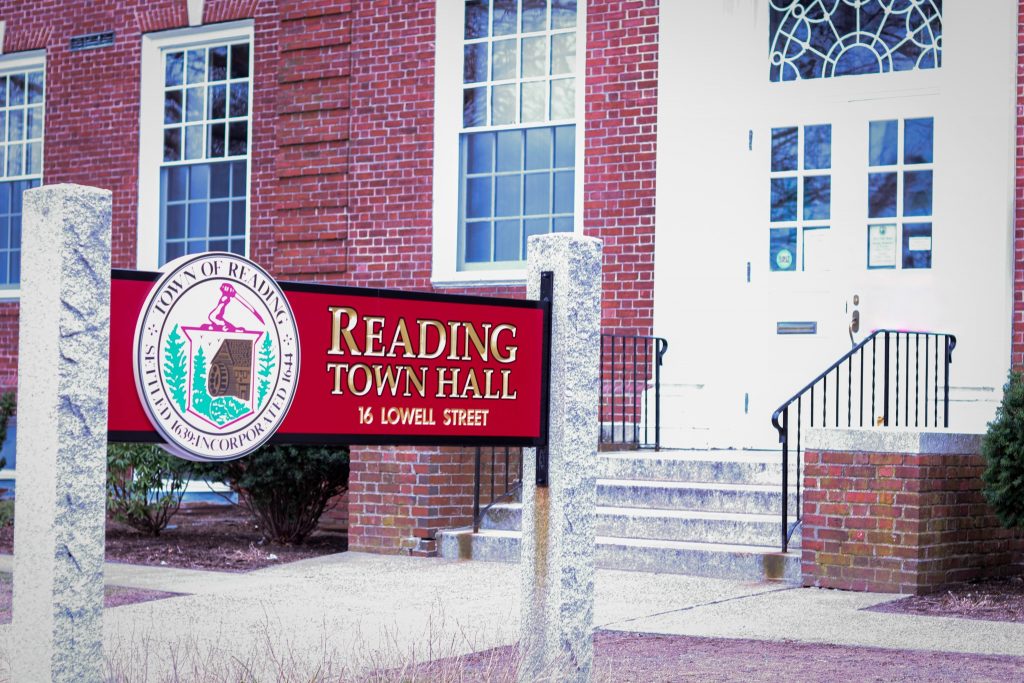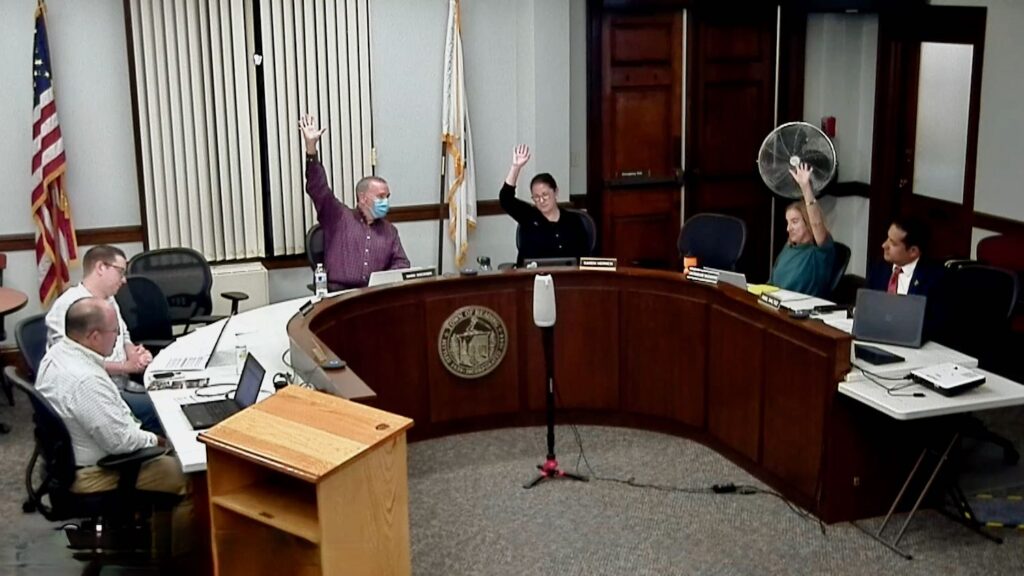
Reading, MA — By a vote of 5-0 for twenty-two articles and a vote of 3-2 for one article, the Select Board closed the warrant for the upcoming Subsequent Town Meeting on Tuesday. The warrant includes Article 7, which asks for $2.2 million for a feasibility study and schematic design for the Killam Elementary School project, Article 11, which expands the Board of Health to five members, and Article 16, which asks for funding of the design phase for improvements to the Haven Street streetscape project. Article 23 is a citizen petition requiring downtown businesses to shovel their sidewalks by 9:00 am after a snowstorm.

Select Board members Chris Haley and Carlo Bacci took issue with Article 20, which, if enacted, would create a bylaw banning the use of polystyrene products by local restaurants and food establishments. Haley encouraged a delay on the article until April Town Meeting to allow for the business community to be informed and educated about the ban. He stated that it is telling that the Select Board has received no emails from members of the business community on the matter. During public comment, Chamber of Commerce Executive Director Lisa Egan also urged the board to wait on the article. Egan cited cost and supply chain issues as factors in her request. “Are alternatives suitable, affordable, available?” Egan asked.
Haley also stated his objection to the ban only applying to local businesses and not businesses that sell polystyrene products in bulk or to businesses that receive food products outside of Reading that are already packaged in the material. “Home Depot and Stop & Shop can continue what they are doing, but it will be Main Street that has to make the change,” Haley argued. Bacci shared his belief that the article is not “fully baked” yet and should be delayed until April or November 2023. Bacci also stated that he hoped that the sponsoring committee, the Climate Advisory Committee, would move to table the article at Town Meeting.
“The goal is one I support, but [the article] might need some adjustments at Town Meeting,” added Select Board member Jackie McCarthy. McCarthy also offered the opinion that expanding the ban to pre-packaged food from outside of Reading could constitute a restriction on interstate trade, which is a federal issue.
Select Board member Karen Herrick, referencing a presentation on the proposal by Climate Advisory Committee chair David Zeek at the board’s August 30 meeting, shared that the Climate Advisory Committee had spent considerable time researching the article, including looking at bylaws in other towns, before submitting an article for Reading. She also reminded the board that any ban that would be enacted would be done in the interest of the health of the community. Town Counsel Ivria Fried also reminded the board that if Town Meeting approves the article, it will still have to be approved by the Attorney General, a process that can take six to nine months. Following this, there is a six-month period after posting by the town clerk before the ban would take effect. This waiting period could allow time for the education process needed.
Haley and Bacci were the dissenting votes when put to the vote to place Article 20 on the warrant.
Article 19 – New Senior Center
The Select Board also discussed Article 19, which would authorize the town to purchase the property at 17 Harnden Street, the former Walgreens, for use as a senior center. The board officially opened the results of a Request for Proposal at the meeting in which the owner of the building suggested a $7 million price tag less an estimated seller credit of $2 million. Chair Mark Dockser explained that the Reading Center for Active Living Committee (ReCALC) has been meeting and exploring ideas to update or replace the current Pleasant Street Center. Dockser indicated that the committee is often asked, “What about the Walgreen’s building?” Dockser also shared that the “opportunity for the community to explore this is on a slightly accelerated timeline.”
Dockser reported that ReCALC currently has a survey available for residents to express their views regarding the needs for seniors in the community and that ReCALC is expecting to report to the board on October 11. “There are a lot of questions, and the community has not been given a lot of information to deal with yet,” Dockser admitted. “We need to gather input on what we want and work with experts to see how to get it done.”
The building itself has 10,000 square feet on the first floor, with an additional 4,000 square feet on the second floor, which is double the amount of space in the Pleasant Street Center, and the adjacent municipal parking lot, with twenty-nine spots, offers two more spaces than the current facility. An architect has presented ReCALC with preliminary ideas about how the building could be arranged to meet the needs of current and expanded programming at the site. “These aren’t meant to be final plans,” Dockser added. Bacci shared Dockser’s view on the uniqueness of the opportunity and stated, “I am willing to see where this goes.” Herrick also expressed interest and encouraged a forum for greater community input into the idea. Dockser indicated that any final approval for the project would likely be in a debt exclusion voted on by the community. “[The purchase of the building] is an interesting opportunity, but will it meet our needs?” Dockser queried.
The Select Board will meet in an executive session on October 11 to review and discuss the specifics of the offer. Given the current uncertainty of the proposal, Town Manager Fidel Maltez indicated that the article is a “placeholder” and could be tabled at Town Meeting if necessary. The Reading Post will have full coverage of all twenty-three articles on the warrant in the coming weeks before Town Meeting begins in November.
Economic Development Update
Economic Development Director Erin Schaeffer presented her activities over the past months, including supporting local businesses and securing over $600,000 in grants in the past year. Schaeffer shared regarding upcoming streetscape improvements for Haven Street, infrastructure planning for the eastern gateway, and participation in the Mystic Highlands Gateway initiative. Schaeffer also reported that there would be an economic development forum on October 6 at 7:00 pm in the RMLD cafeteria at 230 Ash Street. Herrick complemented Schaeffer’s work, commenting, “I appreciate the value you bring.”
Economic-Development-Update-2022-The Reading Business Improvement District Steering Committee (BID) reported that it is moving forward with seeking signatures from downtown property owners to join the organization. The BID, if approved, would be a professional organization working on behalf of property owners in the district to provide supplemental public programs and services. The BID needs sixty percent of downtown owners with at least fifty percent of the assessed value in order to proceed. “We think it is a good thing for downtown Reading,” project chair Jim Freeman stated.
Brian Kimerer, co-chair of the Reading Cultural Council, reported that $23,500 in grants were issued to thirty individuals and organizations in town, such as the Parker Middle School Science Olympiad, the Reading Community Singers, the Downtown ArtWalk, and Porchfest for cultural projects and events in the past year. Grants ranged from $250 to $1,800. Kimerer also shared that the council has at least $20,200 to grant this year and that the application period is now open and will remain open until October 17. The new grants will be awarded in January of 2023.
The Select Board voted 5-0 to approve a class one license transfer to the new 128 Honda on Walkers Brook Drive. The board also reviewed progress being made on the eighteen-spot Town Forest parking lot planned for the newly acquired Grove Street “lot five.” Plans for the parking lot need to be approved by the state’s National Heritage and Endangered Species program before it can move forward.
The Select Board adjourned at 10:30 pm.
